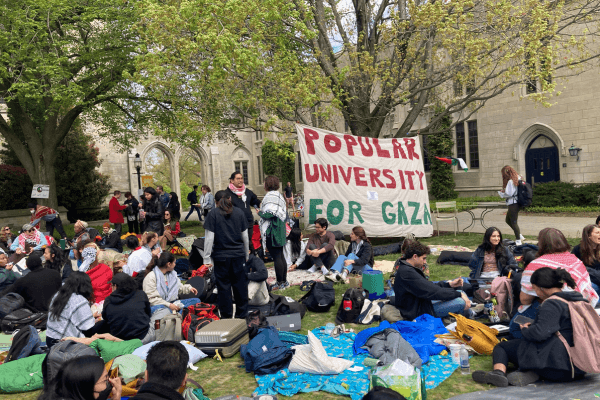When Kristy and Dana met on Match.com 13 years ago, they clicked. Married since 2011, the Dumontslive in Michigan where they share a dynamic sense of humor, an appreciation of McDonald's Coke, and a love for the pets that currently run their lives.
“We really are the couple that does everything together — like, probably way too much together,” Kristy jokes. “We are the couple that grocery shops together, and if she were to watch a next episode of a show without me, that would be grounds for divorce.”
They’ve been ready to grow their family for the past three years — but adoption isn’t always an easy task for same-sex couples.
As of mid-April, a Catholic adoption agency is suing the state of Michigan, claiming that a new state policy requiring them to serve LGBTQ clients violates their religious freedom and other rights. The ACLU, representing the Dumonts, announced on May 22 that it is intervening in this lawsuit in support of the state. This lawsuit is the second in a series of Michigan lawsuits navigating the legal boundary between LGBTQ rights and the religious freedom of faith-based adoption agencies.
It wasn’t until 2015, after families like the Dumonts became recognized under federal law, that Kristy and Dana first considered parenting. Under the new policy, children, too, would now be legally protected members of their family.
“We weren’t really thinking about having kids, but we realized we have so much to give. And there were so many of these children that didn’t have loving homes,” Dana told Sojourners.
Kristy and Dana hoped to foster and eventually adopt older children. They also wanted to go through local agencies, keeping the children in their schools and close to loved ones. At the time, only two adoption agencies met these criteria: Bethany Christian Services and St. Vincent Catholic Charities. While same-sex couples became legally protected in 2015, this year also marked the passing of a new Michigan law allowing child placement agencies to avoid serving LGBTQ couples if it conflicted with their religious beliefs — as long as they referred the couples to another agency. Both Bethany and St. Vincent turned away the Dumonts for being a same-sex couple.
“When you allow discrimination in a public child welfare system, you will lose families. Some families may get turned away from an agency and not be as strong as Kristy and Dana, who went to another agency only to get turned down again. Some decide that’s too high a price,” said Leslie Cooper, Deputy Director of the ACLU LGBT and HIV Project.
Cooper also said that for some families, even knowing that discrimination against them is permitted deters them from considering adoption in the first place.
The Dumonts sued the state of Michigan in 2017 for allowing faith-based agencies contracting with the stateto turn away qualified LGBTQ couples based on religious criteria. In March 2019, the lawsuit (Dumont v. Gordon) resulted in a settlement and subsequent policy requiring state-contracted agencies in Michigan to accept all qualified families, regardless of religious beliefs around LGBTQ couples. While one of the agencies involved, Bethany, responded by adjusting their policies to accommodate the settlement, St. Vincent has instead sued the state.
Some faith-based adoption agencies have a greater ability to adopt antidiscrimination policies than others; nondenominational agencies like Bethany can often change their policies after winning board approval, while Catholic agencies are beholden to Catholic doctrine on same-sex marriage. Due to the structure of the Catholic Church, Catholic adoption agencies would have to shed their Catholic identity to serve LGBTQ couples — something that St. Vincent would likely have had to do.
This new lawsuit (Buck v. Gordon) is a direct challenge to the settlement the Dumonts just won. It involves adoptive mother Melissa Buck, who adopted five special-needs children through St. Vincent, as well as former foster child Shamber Flore.
The Buck family is being represented by The Becket Fund, a non-profit, public interest law firm committed to defending the free exercise of all faiths. Becket says Michigan’s new policy is an attempt to stop the state from partnering with faith-based adoption agencies because of their religious beliefs.
Nick Reaves, an attorney for the Becket Fund, told Sojourners that there are 90 different private adoption agencies throughout Michigan willing to work with same-sex couples. He said that when an LGBTQ couple wants to adopt a child from a faith-based adoption agency that won’t serve them, they can become certified at another agency and then adopt that child through an alternate route.
“Adoption agencies can’t continue serving kids in need at all without a license and a contract from the state,” Reaves said.
“It’s not about discrimination or preventing anyone from fostering. These faith-based agencies either continue operating in a way that’s consistent with their beliefs or they’re be forced to shut down, and shutting down is not in the best interest of kids,” he said.
But Cooper insists that it is about discrimination, especially when public tax dollars are at play.
“Our country’s values have long recognized that the fact that another venue will serve you does not erase the stigma and humiliation of discrimination,” she said. “If an agency chooses to accept taxpayer dollars and provide this critically important government service, they have to put needs of the children first, whatever their beliefs or biases.”
Both Reaves and Cooper agree that faith-based adoption agencies like Bethany and St. Vincent play distinct roles in the child placement system. Often, faith-based agencies work with sibling groups, special-needs kids, and older children more regularly than other agencies. It is because these agencies are so important that Becket wants to ensure they can operate according to their beliefs — it’s also why the ACLU wants to make sure LGBTQ couples have access.
Both parties also agree that it’s essential to increase the number of families welcoming vulnerable children, but differ in what types of families are allowed to adopt.
Today, matching more children with qualified parents is an urgent need; over 400,000 children in the U.S. are currently in foster care — about a quarter of those children need adoptive families — and there are currently 13,000 children in foster care in Michigan.
“Christians are twice as likely to consider adopting and to adopt as the general population. But many of these families might not choose to foster and adopt if they can’t work with an agency that they know will support their religious beliefs,” Reaves said.
While it’s possible that some theologically conservative Christians may decide not to foster or adopt if nondiscrimination laws are in place, these laws would also ensure that LGBTQ Christians can adopt from Christian agencies without fear of discrimination.
Cooperargues that allowing LGBTQ couples to adopt will increase the number of children placed in homes. According to CNN, 21 percent of LGBTQ couples raising children adopt compared to 3 percent of straight couples raising children. As LGBTQ couples become increasingly involved in adoption and foster care, the hope is that more children with be matched with loving families.
Since the outcome of the March settlement, the Dumonts have been able to resume their plans for growing their family.
“We are excited about being able to be licensed as foster parents, start opening our home and expanding our family,” said Kristy. “Our ultimate goal is to adopt through foster care, but just even to start with one kid in our house right now would be fantastic. We’re excited. I’m not going to lie, a little nervous, but excited at the same time.”
Part of the reason the Dumonts are joining Buck v. Gordon is so that they continue to have the right to foster and adopt children from faith-based agencies. But their decision to become involved is bigger than themselves.
“It’s about providing families for children,” said Kristy. “In our last lawsuit we were able to settle with the state, and we are really committed to seeing that the settlement holds. It’s so important not to deny eligible families who are out there waiting to provide loving and safe homes for these kids.”
Got something to say about what you're reading? We value your feedback!







